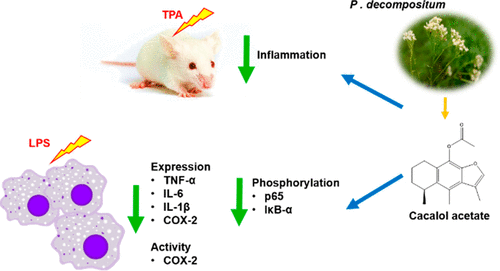当前位置:
X-MOL 学术
›
J. Nat. Prod.
›
论文详情
Our official English website, www.x-mol.net, welcomes your feedback! (Note: you will need to create a separate account there.)
Cacalol Acetate, a Sesquiterpene from Psacalium decompositum, Exerts an Anti-inflammatory Effect through LPS/NF-KB Signaling in Raw 264.7 Macrophages.
Journal of Natural Products ( IF 5.1 ) Pub Date : 2020-07-16 , DOI: 10.1021/acs.jnatprod.0c00300 B Mora-Ramiro 1 , M Jiménez-Estrada 2 , A Zentella-Dehesa 3, 4 , J L Ventura-Gallegos 3, 4 , L E Gomez-Quiroz 5 , W Rosiles-Alanis 1 , F J Alarcón-Aguilar 6 , J C Almanza-Pérez 6
Journal of Natural Products ( IF 5.1 ) Pub Date : 2020-07-16 , DOI: 10.1021/acs.jnatprod.0c00300 B Mora-Ramiro 1 , M Jiménez-Estrada 2 , A Zentella-Dehesa 3, 4 , J L Ventura-Gallegos 3, 4 , L E Gomez-Quiroz 5 , W Rosiles-Alanis 1 , F J Alarcón-Aguilar 6 , J C Almanza-Pérez 6
Affiliation

|
Inflammatory diseases remain critical health problems worldwide. The search for anti-inflammatory drugs is a primary activity in the pharmaceutical industry. Cacalol is a sesquiterpene with anti-inflammatory potential that is isolated from Psacalium decompositum, a medicinal plant with several scientific reports supporting its anti-inflammatory activity. Cacalol acetate (CA) is the most stable form. Nevertheless, the participation of CA in the main signaling pathway associated with inflammation is unknown. Our aim was to study the anti-inflammatory effect of CA and to determine its participation in NF-κB signaling. In TPA-induced edema in mice, CA produced 70.3% inhibition. To elucidate the influence of CA on the NF-κB pathway, RAW 264.7 macrophages were pretreated with CA and then stimulated with LPS, evaluating NF-ΚB activation, IKK phosphorylation, IΚB-α, p65, cytokine expression, and COX-2 release and activity. CA inhibited NF-κB activation and its upstream signaling, decreasing phosphorylation IKB-α and p65 levels. CA also reduced expression and secretion of TNF-α, IL-1β, and IL-6. Additionally, it decreased the activity and expression of COX-2 mRNA. These data support that CA regulates the NF-κB signaling pathway, which might explain, at least in part, its anti-inflammatory effect. CA is a bioactive molecule useful for the development of anti-inflammatory agents with innovative mechanisms of action.
中文翻译:

Cacalol Acetate,一种来自 Psacalium decompositum 的倍半萜,通过 LPS/NF-KB 信号在 Raw 264.7 巨噬细胞中发挥抗炎作用。
炎症性疾病仍然是世界范围内严重的健康问题。寻找抗炎药是制药行业的主要活动。Cacalol 是一种从Psacalium decompositum 中分离出来的具有抗炎潜力的倍半萜烯,一种药用植物,有多项科学报告支持其抗炎活性。醋酸卡卡洛尔 (CA) 是最稳定的形式。然而,CA 在与炎症相关的主要信号通路中的参与尚不清楚。我们的目的是研究 CA 的抗炎作用并确定其参与 NF-κB 信号传导。在 TPA 诱导的小鼠水肿中,CA 产生了 70.3% 的抑制作用。为了阐明 CA 对 NF-κB 通路的影响,RAW 264.7 巨噬细胞用 CA 预处理,然后用 LPS 刺激,评估 NF-ΚB 活化、IKK 磷酸化、IΚB-α、p65、细胞因子表达和 COX-2 释放和活动。CA 抑制 NF-κB 活化及其上游信号,降低磷酸化 IKB-α 和 p65 水平。CA 还降低了 TNF-α、IL-1β 和 IL-6 的表达和分泌。此外,它降低了 COX-2 mRNA 的活性和表达。这些数据支持 CA 调节 NF-κB 信号通路,这至少可以部分解释其抗炎作用。CA 是一种生物活性分子,可用于开发具有创新作用机制的抗炎剂。
更新日期:2020-08-28
中文翻译:

Cacalol Acetate,一种来自 Psacalium decompositum 的倍半萜,通过 LPS/NF-KB 信号在 Raw 264.7 巨噬细胞中发挥抗炎作用。
炎症性疾病仍然是世界范围内严重的健康问题。寻找抗炎药是制药行业的主要活动。Cacalol 是一种从Psacalium decompositum 中分离出来的具有抗炎潜力的倍半萜烯,一种药用植物,有多项科学报告支持其抗炎活性。醋酸卡卡洛尔 (CA) 是最稳定的形式。然而,CA 在与炎症相关的主要信号通路中的参与尚不清楚。我们的目的是研究 CA 的抗炎作用并确定其参与 NF-κB 信号传导。在 TPA 诱导的小鼠水肿中,CA 产生了 70.3% 的抑制作用。为了阐明 CA 对 NF-κB 通路的影响,RAW 264.7 巨噬细胞用 CA 预处理,然后用 LPS 刺激,评估 NF-ΚB 活化、IKK 磷酸化、IΚB-α、p65、细胞因子表达和 COX-2 释放和活动。CA 抑制 NF-κB 活化及其上游信号,降低磷酸化 IKB-α 和 p65 水平。CA 还降低了 TNF-α、IL-1β 和 IL-6 的表达和分泌。此外,它降低了 COX-2 mRNA 的活性和表达。这些数据支持 CA 调节 NF-κB 信号通路,这至少可以部分解释其抗炎作用。CA 是一种生物活性分子,可用于开发具有创新作用机制的抗炎剂。



























 京公网安备 11010802027423号
京公网安备 11010802027423号